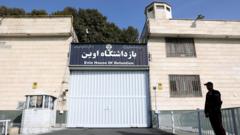Over 189 defendants face charges related to protests sparked by political unrest in Turkey.
Trial Opens for Nearly 200 Protesters in Turkey Amidst Political Tension

Trial Opens for Nearly 200 Protesters in Turkey Amidst Political Tension
Istanbul Court Hosts Initial Hearing Following Arrests from Mass Demonstrations
The trial of approximately 200 individuals arrested during anti-government protests began in Istanbul on Friday. These mass demonstrations erupted on March 19 in response to the detention of Ekrem İmamoğlu, Istanbul's mayor and a prominent opponent of President Recep Tayyip Erdoğan, who has been accused of corruption—a claim he denies.
Of the 189 individuals on trial, most are students, along with eight journalists accused of participating in unlawful gatherings and failing to disperse amidst police warnings. This significant trial represents the first legal proceedings against those arrested during the protests. The Istanbul Prosecutor's Office has indicated that 819 people will face trial across 20 different criminal cases, with potential penalties ranging from six months to five years in prison, according to Human Rights Watch.
One student, who was detained for 20 days following protests in Istanbul’s Saraçhane district, expressed hope for a turnaround in the judicial process, stating, "I hope they will turn back from this shame as soon as possible." Another second-year student from Mimar Sinan University urged that they fear nothing, affirming, "We are not the ones who should be afraid."
As described by the Parents Solidarity Network (PSN), formed by student families, most of the students arrested since March 19 have been released, though around 50 remain incarcerated. Avni Gündoğan, a PSN member, emphasized that their children participated in peaceful protests advocating for democracy and freedom in Turkey.
The journalists, including Yasin Akgül from AFP, face similar charges for covering the protests. During the first day in court, attorney Veysel Ok requested their acquittal based on their role as reporters rather than participants; however, this request was denied. The Turkish Journalists Union (TGS) noted that the cases of the eight journalists are being handled separately from those of the students.
Amidst the political backdrop, İmamoğlu's arrest prior to the 2028 presidential elections raises suspicions of political motivation. Demonstrations continued despite a government ban, as nearly 2,000 individuals were detained since mid-March, predominantly university students.
Of the 189 individuals on trial, most are students, along with eight journalists accused of participating in unlawful gatherings and failing to disperse amidst police warnings. This significant trial represents the first legal proceedings against those arrested during the protests. The Istanbul Prosecutor's Office has indicated that 819 people will face trial across 20 different criminal cases, with potential penalties ranging from six months to five years in prison, according to Human Rights Watch.
One student, who was detained for 20 days following protests in Istanbul’s Saraçhane district, expressed hope for a turnaround in the judicial process, stating, "I hope they will turn back from this shame as soon as possible." Another second-year student from Mimar Sinan University urged that they fear nothing, affirming, "We are not the ones who should be afraid."
As described by the Parents Solidarity Network (PSN), formed by student families, most of the students arrested since March 19 have been released, though around 50 remain incarcerated. Avni Gündoğan, a PSN member, emphasized that their children participated in peaceful protests advocating for democracy and freedom in Turkey.
The journalists, including Yasin Akgül from AFP, face similar charges for covering the protests. During the first day in court, attorney Veysel Ok requested their acquittal based on their role as reporters rather than participants; however, this request was denied. The Turkish Journalists Union (TGS) noted that the cases of the eight journalists are being handled separately from those of the students.
Amidst the political backdrop, İmamoğlu's arrest prior to the 2028 presidential elections raises suspicions of political motivation. Demonstrations continued despite a government ban, as nearly 2,000 individuals were detained since mid-March, predominantly university students.



















